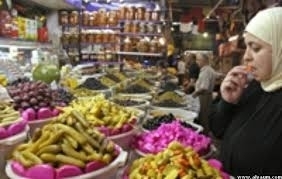Over the past three years, Syrians’ lives have been engulfed by the most violent conflict in the world. According to humanitarian organizations and international institutions, the percentage of Syrians who suffer from daily danger, poverty, and a lack of resources affects more than half of the country’s population. Human Rights Watch has also issued reports to Arabic- and foreign-language media confirming that Syrians who live inside conflict areas or who have been internally displaced all suffer from these harsh conditions. Displaced Syrians living in neighboring Arab countries also endure great suffering.
Meeting living expenses is considered a daily priority for Syrians, who are paying the costs of this conflict and the difficult conditions it has generated. For instance, those still living in Syria – especially in and around Damascus – suffer from the high prices of daily necessities like food and medicine. These high prices are caused by hoarding practiced by dealers operating with state support, or by the sheer absence of these materials in conflict areas. With winter approaching, the suffering of Syrians will increase. It will be especially difficult to acquire diesel, that season’s most important resource. Most public and private gas stations hide diesel in backup tanks and hoard it, only selling when its price multiplies due to increased demand. Many people frequently line up to purchase small amounts of diesel that will last only for a few days, despite the great danger posed by mortars aimed at towns near conflict areas where gas stations are located.
The rise of gas prices has caused a large increase in the cost of transportation. A ride in a microbus in Damascus and in some surrounding areas once cost around 10 Syrian Pounds. Now, in Damascus, the price of a trip varies between 25 and 35 SP. The high prices of rent, daily expenses, and transportation would leave a person earning 20,000 SP in debt just days after they received their paycheck. There are many others who receive smaller salaries or who perform odd jobs to provide their families with their daily necessities.
Additional expenses:
The regime has systematic methods to find young men avoiding military service. Security forces seek 18-21 year old males, inspecting all buses and taxis and examining all identification cards. Those who lack proof of exemption or have postponed their service for educational reasons are arrested and sent to fighting fronts without proper training. If soldiers manning checkpoints are in a bad mood, have orders to do so, or are located in a sensitive area, even pedestrians are inspected. In addition, the regime has arrested many young men, especially the displaced, in the street or even in their homes to conscript them into military service. This has occurred despite the arrival of thousands of volunteers from outside of Syria who came to fight on the regime’s behalf, and thousands of Syrians who have volunteered to fight in exchange for monthly salaries and the privilege of exploiting other citizens without punishment.
The regime has started imposing new, unprecedentedly high taxes and collecting money from pro- and anti-regime citizens alike despite poor and deteriorating conditions. About a month ago, the regime imposed a new tax on passports, which prior to the conflict cost about 1,700 SP each, then 5,000 SP, and more recently climbed to 60,000 SP because of new fees and stamps for military service exemption for men under 40. In addition, taxes on electricity, water and communication services have also risen considerably. Some Syrian youth dream of emigrating to escape the tragic situation in their mother country, but even this dangerous dream runs up against financial obstacles. Moreover, no one knows where this trip will lead them – many Syrians who have emigrated illegally by boat have drowned or vanished.
Returning to the issue of taxation, branches of the Syrian government that specialize in statistics have launched a new campaign. They have begun counting houses in urban centers and suburbs, assigning numbers to houses and recording their size and the number of family members they hold. The authorities have also registered the names, information, and telephone numbers of homeowners. People have started spreading rumors about state-led foreign and domestic real estate investment in those areas, while others believe that the real reason for these statistics was to estimate the feasibility of increased taxation on property. In fact, the taxes that may be imposed are old. They are usually called property taxes, and Syrians used to pay them to the real estate department every year.
The Syrian government has strangled its citizens and left them with no space to breathe or take respite from this cruel war. The regime faces economic collapse, and has started imposing new taxes to fill the huge financial gap caused by its military campaign against the Syrian people.
......


